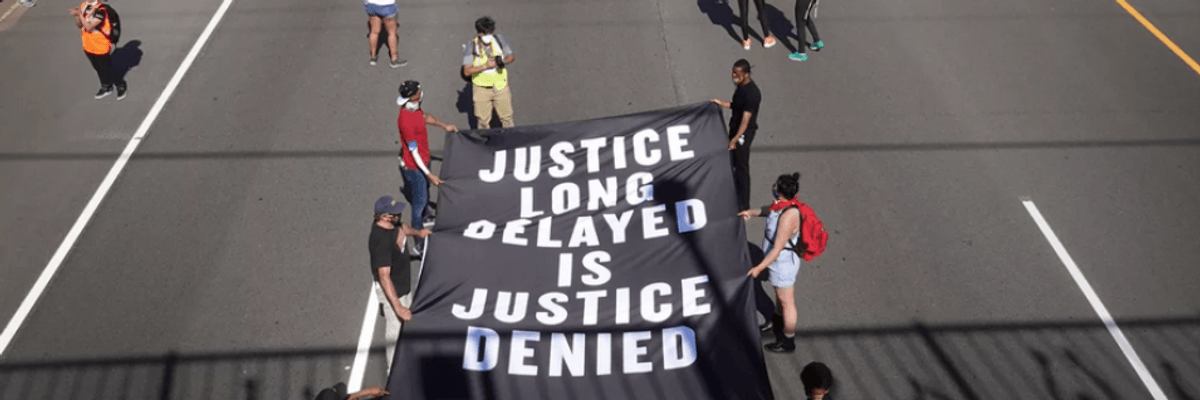Since announcing Wednesday he will hold his first campaign rally in months next week, President Donald Trump has come in for harsh criticism from advocates and lawmakers for scheduling the event to take place in the city of Tulsa, Oklahoma--the site of a brutal racist massacre in 1921--on the specific date of June 19th, the holiday known as Juneteenth which commemorates the end of slavery in the United States.
"This isn't just a wink to white supremacists--he's throwing them a welcome home party," Sen. Kamala Harris (D-Calif.) said on Twitter.
Trump's rally will come in the midst of what has become a moment of national reckoning on racism and policing. Demonstrations in the wake of the killing of George Floyd by four Minneapolis police officers have sparked a worldwide movement against racial injustice and police brutality.
In that context, the history of the location and the timing of next Friday's rally was not lost on critics.
As Democracy Now!explained:
It was on June 19, 1865, that enslaved Africans in Texas first learned they were free--two years after Abraham Lincoln signed the Emancipation Proclamation. The day is now celebrated as Juneteenth.
Tulsa recently marked the 99th anniversary of one of the deadliest mass killings of African Americans in U.S. history. In 1921, a white mob killed as many as 300 people, most of them Black, after a Black man was accused of assaulting a white elevator operator. The white mobs destroyed a thriving African American business district known at the time as the Black Wall Street of America.
Trump's decision to rally supporters at the site of racist violence is nothing new for the Republican Party. On August 3, 1980, then-candidate Ronald Reagan addressed supporters at the Neshoba County Fair, just a few miles from the Philadelphia, Mississippi site of the Freedom Summer murders of three civil rights advocates in June 1964.
The decision by Trump to head to Tulsa was announced Wednesday during a roundtable with a group of black supporters at the White House. On Thursday, press secretary Kayleigh McEnany addressed the growing controversy over the date and location, telling reporters that Trump "often shares the great work he has done for minority communities" during his campaign rallies.
"It's a meaningful day to him, and it's a day where wants to share some of the progress that's been made as we look forward and more that needs to be done," said McEnany.
But the president's critics weren't buying it, referring to Trump's longstanding and well-established history of racist comments and behavior stemming from long before his entry into presidential politics in 2015.
"It's not only offensive but it also feels like a desecration," author Morgan Jerkins said on Twitter. "We still haven't found all the graves of those who were massacred there back in 1921."
Rep. Al Green (D-Tex.), a frequent critic of the president who has regularly introduced articles of impeachment in the House against Trump, tweeted that the decision was meant to send a message of hate.
"Trump rally with rebel flags (a symbol of slavery and racism) in Tulsa, OK (the place of #TulsaMassacre) on Juneteenth (a day of emancipation recognition) is more than a slap in the face to African Americans; it is overt racism from the highest office in the land," Green said.
Other lawmakers weighed in on the decision, calling Trump out in stark terms.
"Donald Trump is a racist," said Sen. Ed Markey (D-Mass.). "He has contempt for the history of Black Americans and the Black lives destroyed by white mobs at the Tulsa Massacre. We need to do more than defeat him, we need to root out the systemic racism in our country that enabled him to ever come to power."

